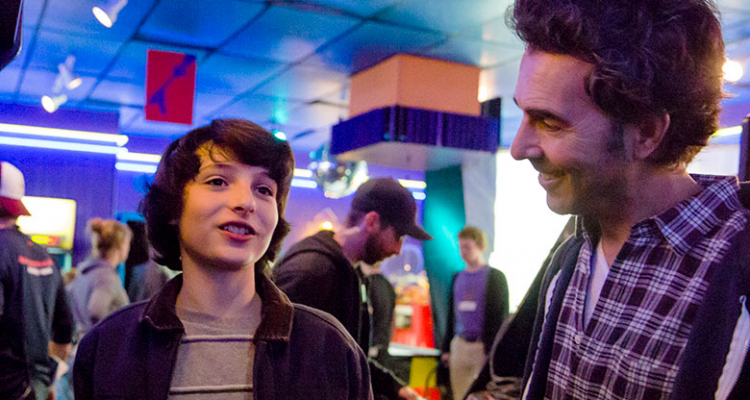When Shawn Levy helped pitch the Duffer Bros. “Stranger Things” to networks in 2015 he readily admits he didn’t think a period ’80s show with inter-dimensional monsters was going to become a TV awards season staple. Two complete seasons later the fan favorite Netflix series has earned 31 Emmy nominations including back-to-back Outstanding Drama Series nods and five wins last year including Outstanding Casting and Outstanding Title Design. It’s all part of an impressive new chapter in Levy’s career that has seen the “Night at the Museum” franchise director take his production company 21 Laps Entertainment into new directions including an Oscar nod for producing Best Picture nominee “Arrival.”
READ MORE: Shawn Levy talks time jumps and character relationships for “Stranger Things” season 3
Levy has directed episodes three and four of each of the first three seasons of “Stranger Things” and teased where the upcoming season might be headed during an interview late last month. He also provided an update on when his next big-screen effort, the adaptation of the popular video game “Uncharted” with Tom Holland on board to star, might begin production.
_____
The Playlist: Congratulations on all the Emmy nominations.
Shawn Levy: Thank you. That was definitely thrilling news.
After you made the Drama Series cut last year how did you feel about the love this time around?
Well, the truth is, we went into season two not wanting to disappoint our fans, but above all not wanting to disappoint ourselves. And we went into season two super vigilant about complacency. We tried really hard to make a second season that felt loyal to the ethos of “Stranger Things” but did not feel like a repeat. Did not feel like a rehash. And so, this kind of validation? It was a complete shock with season one because you don’t set out looking for awards when you make an ’80s show with inter-dimensional monsters. But I would say, you know, it was equally surprising, and for different reasons. Because we were definitely taking a bigger swing with season two and a different kind of gesture in many ways. So, very gratifying to have that acknowledged and resonate.
You mentioned about wanting to do something different, taking a big swing. What would you say was the most difficult aspect of tackling season two from a production standpoint?
Well for one thing, just, you know, asking and thankfully getting the resources we need to tell a much more cinematic-scaled story. The learning curve for all of us, especially the Duffer Brothers, you know, who had not made a bunch of movies and a bunch of television shows. Figuring out our needs and our process with action, with visual effects, with scope. And to do all of that without losing the heart of the show, which is the character storytelling. That balancing act, in the midst of new skill set acquisition, that was a challenge. But also it’s what made season two really interesting to us who made it.
And I notice that for season 3 you once again directed the third and fourth episodes. Is that case of “If it ain’t broke, don’t fix it?”
I think it’s more than that. I think it’s evidence of the profound superstition that the Duffers and I share. You know, in season one I did the third and fourth episode because I needed to send the Brothers into hibernation to write the second half of the season. Once that worked out pretty well, we didn’t dare jinx it in season two. And when that worked out really well, we sure as hell aren’t going to mess with it in season three.
Are there any other superstitions? Do you, like, not shoot on Friday afternoons or something? Is there anything else that you guys have sort of kept that way?
That’s really interesting. Not in so many words. I think in general, we are wary of reading too much of our own press. And going down the rabbit holes of fan theories and desires. I think that the only other superstition is that we got here because of a reliance on our own instincts and above all a reliance on the Duffers’ instincts. And my whole job, as both director and certainly as their executive producer, is to create a culture for our show that allows them to listen to themselves, trust each other, and execute. So my only other superstition is, don’t let the outside voices ever get too loud in our ears, because it might drown out the inner voices that got us to this point.
Was there any particular moment or episode in season two that you’re most proud of?
Wow. I mean, these are some small big, some big. I mean, look. As a fan, the moment where Mike [Finn Wolfhard] and Eleven [Millie Bobby Brown] see each other, when she walks in the door of Joyce’s house is as achingly beautiful a moment as I’ve seen in any TV show or movie. Another one would be the entire sequence that I directed where Noah Schnapp is getting possessed by the Shadow Monster. That was a 12-year-old kid in the middle of a soccer field acting against nothing. Creating an environment where I could convey to Noah the feeling and the visuals of what would eventually be onscreen and creating it with sufficient detail and vividness so that he could take that leap of faith? I was thrilled with how that turned out. And overall, I’d have to say, when you ask about something I’m impressed and proud of it’s Noah’s performance is season two. He may not be Emmy-nominated, but he was, in my opinion, absolutely Emmy-worthy. That’s the centerpiece of season two.


